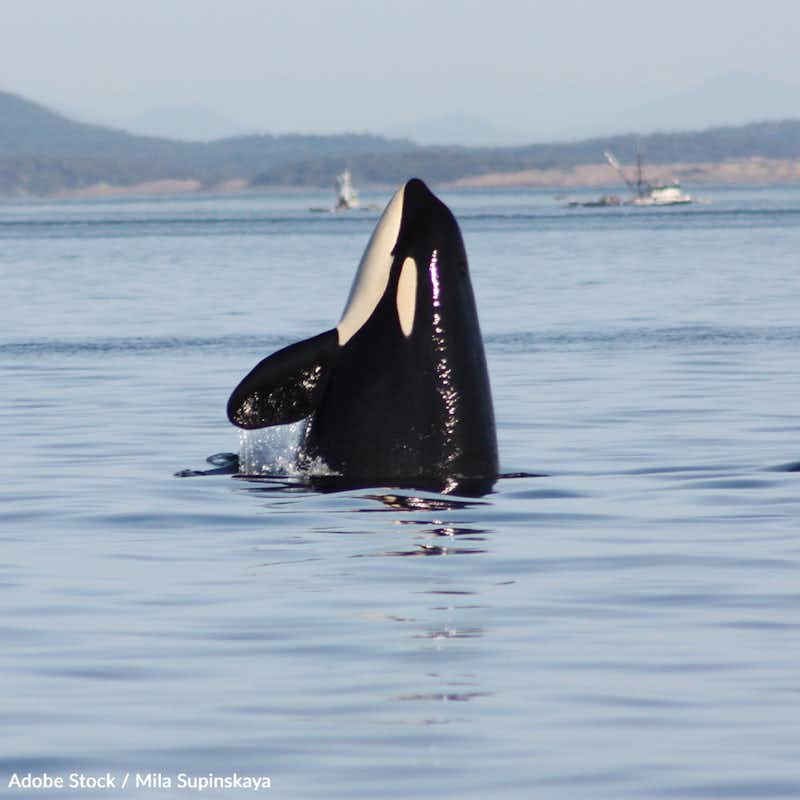Stop Speeding Ships From Killing Whales
34,474 signatures toward our 50,000 Goal
Sponsor: Free The Ocean
Hundreds of whales are being killed by speeding ships along the West Coast. Help us ask NOAA to implement coastal speed limits and save the whales!

A large number of blue whales, humpback whales, gray whales and vulnerable southern resident killer whales are being killed by speeding ships along the West Coast of the United States.
Cargo and cruise boat traffic has increased over the last several decades to the point where ships have become one of the deadliest threats whales face in open oceans and coastal waters1.
Between 2016 and 2020, at least 112 beached or dead whales were identified by the National Oceanic and Atmospheric Administration (NOAA) as having “injuries consistent with ship strikes." Using this and other statistics, the Center for Biological Diversity and Friends of the Earth filed a lawsuit against NOAA to protect coastal whale populations by implementing new rules to reduce ship strike2.
Cargo ships can be massive, driving such force into unsuspecting whales that the animals are nearly always mortally wounded. However, the actual number of whales killed by ship strikes could be 20 times larger than official reports, since most dead whales sink3.
At least 27 whales have been struck by ships in California over the past three years, according to Federal records, including a dead fin whale draped across the bow of a container ship as it entered San Francisco Bay in 20184.
In 2020, horrific photos of two fin whales pinned to the hull of an Australian naval ship were spread worldwide. After conducting exercises in the waters off the Southern California coast, the ship berthed in a San Diego harbor where two whale bodies — one 65 feet long, the other just 25 feet — dislodged from the ship's hull beneath the surface5.
Ship strikes are a leading cause of whale deaths on both the East and West coasts. These deaths can be reduced through mandatory speed limits through whale habitat, including the coastal areas as ships approach California ports6.
Help us ask NOAA to take action for whales implement these speed limits in coastal whale habitat!
- Susanne Rust, Los Angeles Times (5 August 2021), "As cargo shipments boom, ship strikes imperil whales in California and worldwide."
- Center for Biological Diversity and Friends of the Earth, United States District Court For The Northern District of California, (14 January 2021), "Complaint For Declaratory And Injunctive Relief."
- Jackie Dragon, Greenpeace (10 January 2013), "Endangered blue whales killed by commercial ship strikes."
- Jesse Ryan, Washington Post (18 March 2019), "Whales are facing a big, deadly threat along West Coast: Massive ships."
- David Matthews, Daily News (12 May 2021), "Australian naval vessel docks in San Diego with two dead whales stuck to hull."
- Catherine Ware Kilduff, Center for Biological Diversity (26 January 2021), "Speeding Ships Kill Too Many Whales."
The Petition:
To the director of the National Oceanic and Atmospheric Administration,
Hundreds of blue whales, humpback whales, gray whales and vulnerable southern resident killer whales are being killed by speeding ships along the West Coast of the United States.
Cargo ships can be massive, driving such force into unsuspecting whales that the animals are nearly always mortally wounded.
Between 2016 and 2020, at least 112 beached or dead whales were identified by the National Oceanic and Atmospheric Administration as having “injuries consistent with ship strikes."
The actual number of whales killed by ship strikes could be 20 times larger than official reports, since most dead whales sink
Ship strikes are a leading cause of whale deaths on both the East and West coasts. These deaths can be reduced through mandatory speed limits through whale habitat, including the coastal areas as ships approach California ports
I implore you to take action for whales and implement speed limits for ships along coastal areas where whales make their habitat.
Sincerely,
 Welcome Back! Log In to Continue
Welcome Back! Log In to Continue